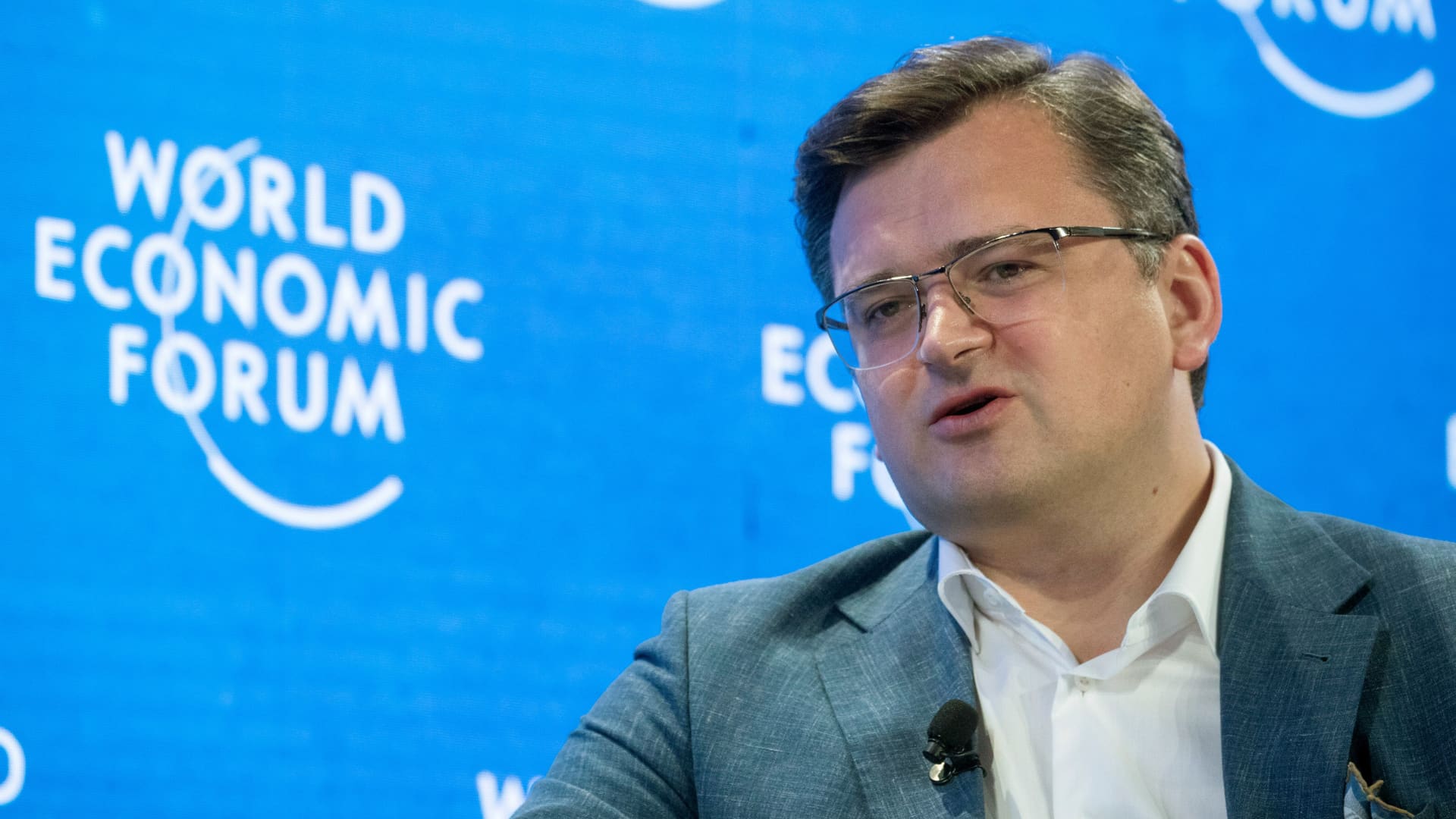Ireland’s Taoiseach: Keen to develop relationship with China
Leo Varadkar, the Taoiseach of Ireland, discusses Chinese Premier Li Qiang’s recent visit to the country, access to finance in Europe, and his outlook for how AI will impact the jobs market.
Top ad guru says Big Tech will keep dominating the market
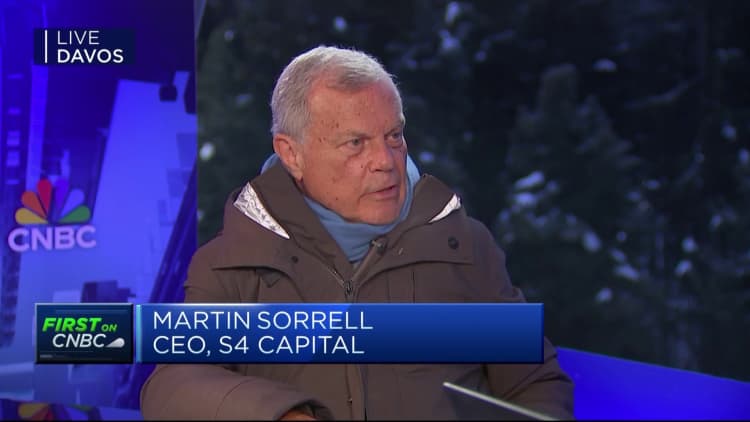
The strength or weakness of the ad market depends on where you look — and Big Tech will continue to dominate in 2024, according to S4 Capital co-founder Martin Sorrell.
“It’s a bifurcated market. Linear TV is having a very tough time,” he told CNBC at the World Economic Forum in Davos, Switzerland, on Thursday.
Players in that space with live sports to support them, like Fox and Disney, saw narrower losses in ad revenue than those that didn’t, Sorrell said.
“On the other side, the platforms are up about 10%. Alphabet, Meta, Amazon, all did, you know, 20%, 12%, 25% in Q3, and had very strong first and second quarters,” he continued.
Platforms continue to deliver better short-term activation, performance and measurement, he noted. Meanwhile, big companies are continuing to spend and invest despite macro headwinds, but they are spending in a more short-term, activation-focused, performance-focused way, he said.
“And that’s what’s going to happen this year too. I mean, linear TV is going to be under pressure … the linear TV market is in what I would call a consolidation phase.”
Sorrell pointed to Disney CEO Bob Iger telling CNBC in mid-2023 that the company was “open minded” on its continued ownership of networks such as ABC, FX and National Geographic, and had to “be objective about the future of those businesses.”
“The problem there is as they consolidate, when you actually do the numbers … net revenue and EBITDA actually increased from linear TV, which is not the direction in which you want to go, you want to increase your digital exposure to streaming and everything else,” Sorrell said.
—Jenni Reid
Kuleba: No change in tone from the U.S. administration
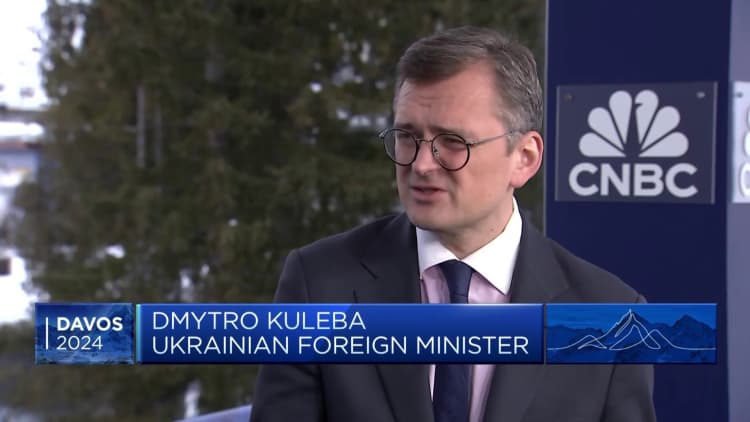
Ukrainian Minister of Foreign Affairs Dmytro Kuleba said he’s seen no change in tone from the U.S. administration when it comes to how they want Ukraine to approach the war and diplomacy.
“I have no reasons to doubt the sincerity of the commitments of the Biden administration to continue helping Ukraine,” he told CNBC.
“Nor do I have reasons to believe that the Republican Party as a whole does not realize how fundamental it is to defeat Russia in Ukraine and not to allow Russia to continue destroying the world order built by America,” he said.
“I mean let’s be honest, the word we live in was built under American leadership.”
The U.S. administration has recently stepped up the pressure on Congress to provide billions more in aid to Kyiv in its war with Russia.
—Matt Clinch
Ukraine’s Kuleba: Davos has been very reassuring
Ukrainian Foreign Minister Dmytro Kuleba gestures during a discussion at the World Economic Forum 2022 (WEF) in the Alpine resort of Davos, Switzerland May 25, 2022.
Arnd Wiegmann | Reuters
Ukraine’s foreign affairs minister, Dmytro Kuleba, told CNBC at Davos that the event had been very reassuring.
“The atmosphere here was positive in a way that people are looking for solutions instead of endlessly discussing problems,” he told CNBC’s Steve Sedgwick.
“President Zelenskyy had excellent meetings with both political leadership and business leaders. And messages that were received from both wings are very encouraging.”
“The most important thing is that you feel, you sense, and you hear the commitment, the commitment to stand by Ukraine, to keep helping one way or another,” he added.
The war in Ukraine is dominating conversations at the World Economic Forum in Davos this week, with Ukraine’s President Volodymyr Zelenskyy making the most of the opportunity to address the global business and political elite, including JPMorgan chief Jamie Dimon.
Dimon said he and other business leaders met Zelenskyy on Tuesday to discuss “refinancing” the redevelopment of Ukraine once the war with Russia is over. “So, he is starting to think ahead,” Dimon said of the Ukrainian president.
—Matt Clinch
‘It won’t be the end of the world’: Executives give their verdict on a Trump return to the White House
U.S. business leaders seem nonplussed about the prospect of Donald Trump returning to the White House, while their European counterparts appear nervous, according to executives who spoke to CNBC at the World Economic Forum in Davos, Switzerland.
One prominent U.S. business executive, who asked not to be named because his discussions with foreign leaders were private, said some of the fear may be due to a lack of understanding of the checks and balances built into the U.S. government.
Former U.S. President and Republican presidential candidate Donald Trump speaks during a rally ahead of the New Hampshire primary election, in Portsmouth, New Hampshire, U.S., January 17, 2024.
Elizabeth Frantz | Reuters
“I’m not sure Europeans understand how weak executive orders are,” that person said. “We have a justice system. Congress will probably be divided. It’s right to be cautious, but it won’t be the end of the world.”
“He’s going to win the presidency,” a U.S. bank CEO predicted. “Many of his policies were right.”
— Lucy Handley
Euro area nations must roll back energy support schemes and reduce borrowing, Eurogroup president says
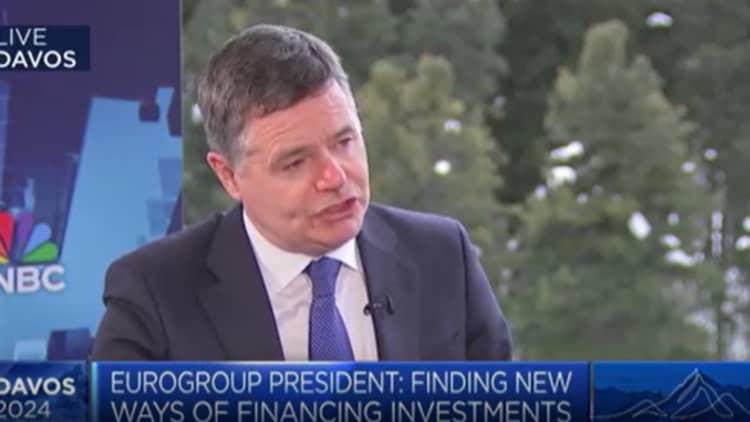
Euro area nations should roll back energy support packages and coordinate to reduce borrowing over the next year and a half, Eurogroup President Paschal Donohoe told CNBC.
The Eurogroup, which comprises finance ministers of euro zone member states, has committed to a restrictive stance for 2024.
“That means as we phase out energy support measures, they need to go into lower levels of borrowing, and not other forms of spending or tax reduction,” Donohoe said.
Last year, the euro area deficit was above 3%, and this year it is expected to be below 3%, leading to average debt levels around 90% of national income, he noted.
“Reducing borrowing across every country, of course it’s always complex with the political and social challenges we face, but we’ve a better chance of pulling it off in the majority of countries if all countries feel we’re going in the right direction and the same direction, and this is what Eurogroup is focusing on at the moment,” he said.
The group’s second task is to “find a way of financing the huge investments that are to come, that are not entirely out of the European taxpayer, and that involves working with the private sector,” he added.
— Jenni Reid
Saudi Arabia plans to tap debt market for funding in 2024, finance minister says
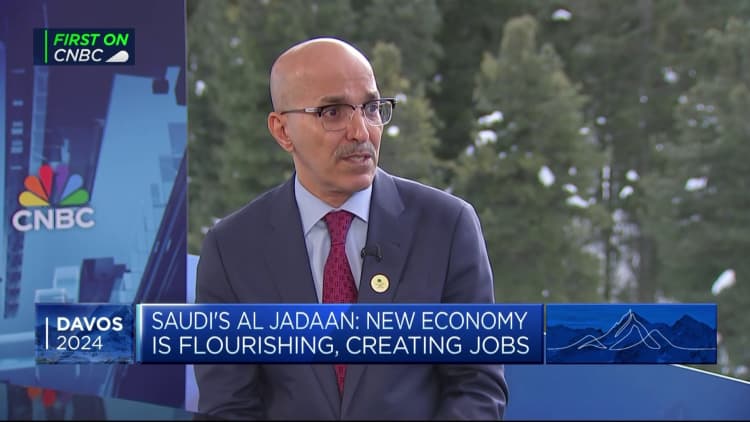
Saudi Arabia predicts a budget deficit in 2024. Asked about whether the kingdom would tap debt markets to finance it, Saudi Finance Minister Mohammed Al Jadaan replied: “The short answer is yes.”
“We announced our debt strategy and the schedule for this year just to give the market predictability. And we’ll continue … we are going to tap the markets locally and internationally,” the minister told CNBC’s Dan Murphy.
“We are not in a position where we are desperate to borrow but as long as the market situation is supporting that with reasonable yields, we will go into the market and we may borrow even more to manage our liabilities for future use,” Al Jadaan said.
The world’s largest oil exporter in early January approved a borrowing plan for the year that forecast $23 billion in financing needs for 2024.
— Natasha Turak
Saudi Arabia’s non-oil economy is growing at a healthy pace, minister says
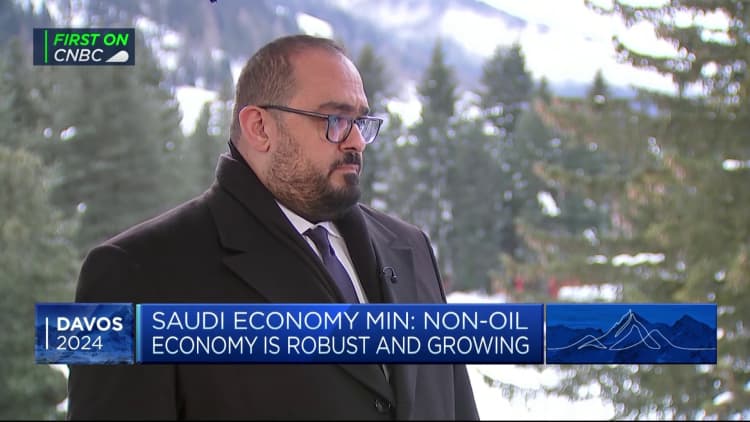
Saudi Arabia’s economy is growing at a robust pace, boosted by non-oil growth in particular, the kingdom’s minister of economy and planning said on Thursday.
“When we look at the important part of the Saudi economy, it’s the non-oil economy, the various sectors; and those have continued to grow at a very healthy pace,” Faisal Alibrahim told CNBC’s Dan Murphy.
“In 2022. Saudi Arabia registered 8.7% composite growth, but non-oil economy was growing at 6%. The first three quarters of ’23 for which I have data, it’s well above 4% for the non oil economy. So we believe that’s going to be continued,” the minister said.
“We continue to invest, we continue to spend, there’s continued growth and travel and tourism into the kingdom. The Saudi consumer spends in a very healthy way so all of the components of the economy are healthy in the kingdom, healthy in the GCC. There is no reason for us to be to be concerned about it.”
— Natasha Turak
Investors still care about sustainability, UN’s Mark Carney says
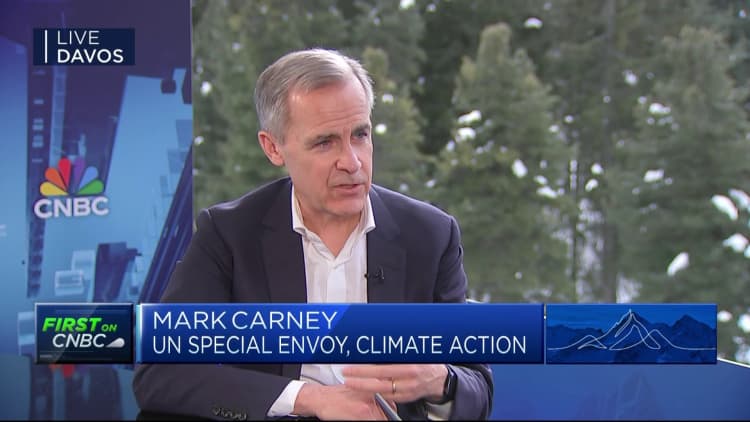
Mark Carney, the United Nations special envoy on climate action and finance, told CNBC that he believed sustainability “hasn’t slipped down the agenda of investors.”
The former governor of the Bank of England said that investment in clean energy grew by 50% in 2023 to $1.8 trillion, up from $1.2 trillion in 2022, adding that this represented almost twice as much investment as in conventional energy.
“There’s a huge surge in investment in clean energy, in EVs, [electric vehicles] in the whole supply chain,” Carney said at the World Economic Forum in Davos, Switzerland.
Carney also discussed the impact of recent climate policy changes, such as those announced by the U.K. “Anything that was done in the United Kingdom, or in the United States, Canada, elsewhere really over the course of the last year in terms of climate policy was absolutely dwarfed by the decisions that were taken at COP28 in Dubai,” he said.
“The direction is clear and the order of magnitude of what’s been decided in recent months is enormous,” Carney said.
— Vicky McKeever
Palantir CEO: Antisemitism has been ‘the canary in the coalmine’
Alex Karp, CEO and co-founder of data software company Palantir, discussed a visit to Israel he made with the company’s board earlier this month.
“With Israel, most people in positions of authority realize that what happened on October 7 was one of the worst terror attacks the West has ever seen,” he told CNBC at the World Economic Forum in Davos, Switzerland, on Wednesday.
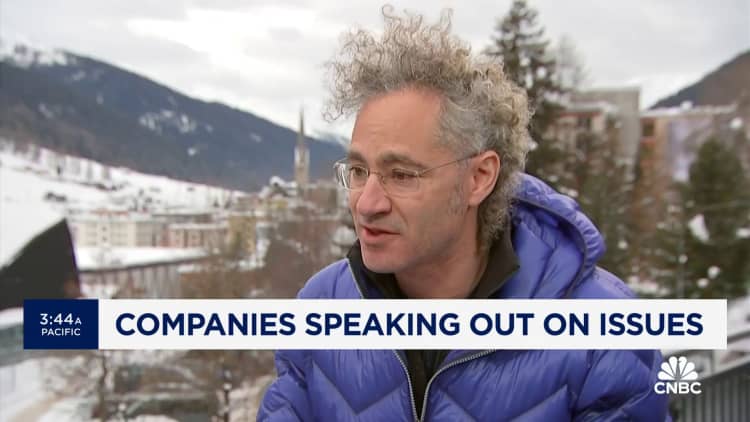
“It is incumbent on us [as leaders] to actually not only to speak loudly in private but occasionally show what we mean in public,” he added.
“Antisemitism as a kind of prejudice has always been the canary in the coalmine for [people saying] ‘your society isn’t working, your university isn’t working, you’re not providing real growth to your population.’ And because you’re not explaining why it doesn’t work you just go blame the Jews,” he said.
— Lucy Handley
Kremlin dismisses Davos, saying it’s not really interested anymore
The Kremlin said its interest in the World Economic Forum has waned in recent years, after its participation in the event ended following its 2022 invasion of Ukraine.
“Our business has not participated in Davos for several years. Therefore, our interest in this forum has decreased,” the Kremlin’s Press Secretary Dmitry Peskov told CNBC in emailed comments Thursday.
Russian officials, organizations and business leaders flocked to Davos in the years before Russia’s invasion of Ukraine, hoping to attract investment into the country. Russian President Vladimir Putin last made a keynote speech to WEF in 2021 when the event was held virtually due to the Covid-19 pandemic.
Russian President Vladimir Putin addresses the virtual World Economic Forum via a video link from Moscow on January 27, 2021. (Photo by Mikhail KLIMENTYEV / SPUTNIK / AFP) (Photo by MIKHAIL KLIMENTYEV/SPUTNIK/AFP via Getty Images)
Mikhail Klimentyev | Afp | Getty Images
Since Feb. 2022, however, almost 2,000 Russian individuals and entities linked to the Kremlin, or deemed to be undermining or threatening the territorial integrity, sovereignty and independence of Ukraine, have been sanctioned and subject to asset freezes and travel bans by the EU and Ukraine’s other Western allies, including Switzerland.
Among the 2024 list of public figures attending WEF, there are none from Russia.
When asked if Moscow had followed a keynote address made by Ukraine’s President Volodymyr Zelenskyy Tuesday, Peskov replied: “We always closely monitor statements from Kyiv.”
— Holly Ellyatt
China sends largest delegation to Davos in years
Participants walk in the street of the Alpine resort of Davos during the World Economic Forum.
Fabrice Coffrini | Afp | Getty Images
China is courting the global elite at the World Economic Forum in Davos, Switzerland, with a delegation led by Chinese Premier Li Qiang that thought to be the largest since 2017, when President Xi Jinping brought an 80-strong cohort.
“Choosing investment in the Chinese market is not a risk, but an opportunity,” Li said in address to delegates on Tuesday, before meeting the CEOs of JPMorgan, Bank of America, Standard Chartered and Blackstone, alongside the governor of the People’s Bank of China.
Outside the main congress center, one group of Chinese delegates that CNBC spoke to said they were attending for a broad brush of reasons, including “finance and trade and commerce.”
— Lucy Handley
Need to ask whether AI will increase inequality: Ontario Teachers’ Pension Plan CEO
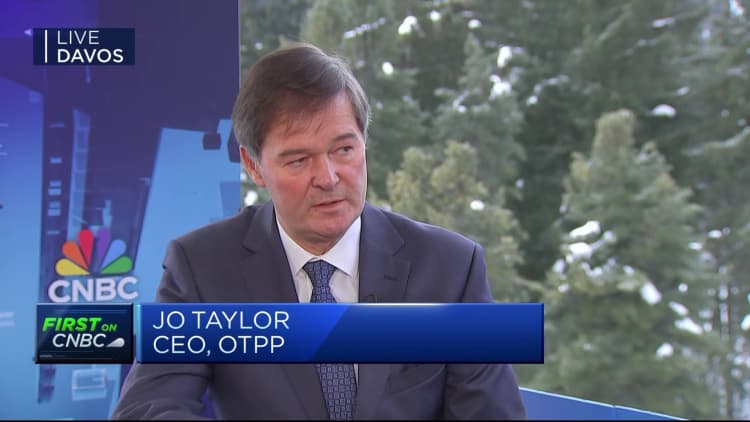
Jo Taylor, CEO of the Ontario Teachers’ Pension Plan, raised concerns that artificial intelligence (AI) could cause inequality to rise, speaking to CNBC at the World Economic Forum in Davos, Switzerland.
In a report that Taylor wrote for WEF about navigating this “new world,” the rapid rise of AI was highlighted as a key theme.
He told CNBC that there is “absolute justification to say AI will be transformational,” and that everyone needs to consider how it will affect them.
One question around AI, Taylor said, was whether it would “increase inequality in different countries rather than improve the lot for many people across the board.”
Generative AI has been a key topic among delegates at Davos.
— Vicky McKeever
We don’t want to see an AI ‘Hiroshima,’ Salesforce CEO says
Marc Benioff, co-founder, chairman and CEO Salesforce, speaking with CNBC’s Sara Eisen at the World Economic Forum Annual Meeting in Davos, Switzerland on Jan. 17th, 2024.
Adam Galici | CNBC
The tech industry is setting down safety protocols and establishing trust principles in relation to the developing AI software that has taken the world by storm to avoid a “Hiroshima moment,” Salesforce CEO Marc Benioff told a World Economic Forum panel in Davos, Switzerland.
“This is a huge moment for AI. AI took a huge leap forward in the last year or two years,” he noted, acknowledging that, amid the rapid pace of its progress, the technology “could go really wrong.”
Concerns have mounted over the trustworthiness and uses of AI, with critics worldwide raising questions over the software coming to replace human workers. Earlier this week, the International Monetary Fund released a report that warned that nearly 40% of jobs across the globe could be impacted by the rise of artificial intelligence.
“We don’t want something to go really wrong. That’s why we’re going to, like, that safety summit. That’s why we’re talking about trust,” Benioff said Thursday. “We don’t want to have a Hiroshima moment. We’ve seen technology go really wrong, and we saw a Hiroshima. We don’t want to see an AI Hiroshima. We want to make sure that we’ve got our head around this now.”
Salesforce has skin in the game after launching its own generative AI software Einstein GPT and joining a global race among software developers to incorporate generative AI capabilities into their existing products.
— Ruxandra Iordache
Red Sea attacks weighing on WTO goods trade sentiment, organization’s chief says
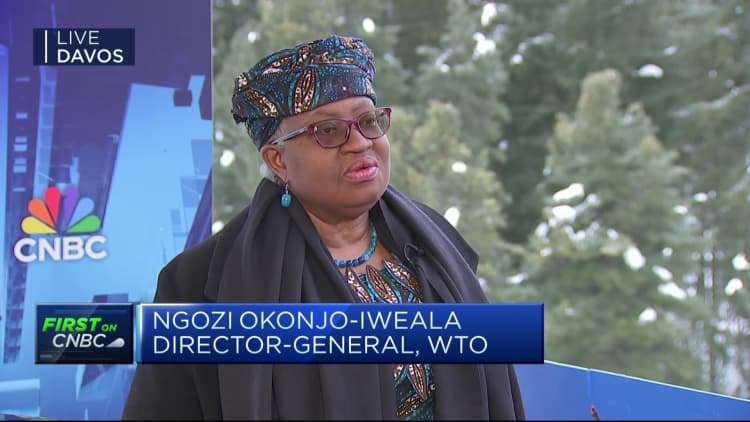
Ngozi Okonjo-Iweala, director general of the World Trade Organization (WTO), told CNBC that attacks on vessels in the Red Sea had made the body “slightly less optimistic” on its goods trade forecast for 2024.
The Houthis, an Iran-backed militia group, have been attacking vessels in the region since November, causing many ships to re-route.
“The fact that container shipping has had to divert and the higher costs are weighing on our sentiment with respect to what will happen with goods trade this year,” she said, speaking at the World Trade Forum in Davos, Switzerland.
In October, the WTO projected 3.3% trade growth for this year, up from an expected growth of 0.8% in 2023.
Okonjo-Iweala said the “prospect of maybe a wider spread of the conflict is also very concerning.” She added that the downgrading of global GDP (gross domestic product) forecasts also impacted trade because it “hits aggregate demand all around.”
Despite the disruption in the Red Sea, Okonjo-Iweala said the WTO still expected trade growth numbers to be better this year than in 2023.
— Vicky McKeever
Israel-Saudi normalization ‘key to the ability to exit from the war into a new horizon’: Israeli president
Israeli President Isaac Herzog gestures as he sits next to a photograph showing 10-month-old baby Kfir Bibas held by Hamas during a session of the World Economic Forum (WEF) meeting in Davos on January 18, 2024.
Fabrice Coffrini | Afp | Getty Images
Normalizing relations with Middle East heavyweight Saudi Arabia is pivotal for Israel to transition from the current war against Palestinian militant group Hamas toward new opportunities, Israel’s president said.
“Clearly, the Saudi option, as part of it, of the whole normalization process is key to the ability to exit from the war into a new horizon,” Isaac Herzog said in a special address at the World Economic Forum in Davos, Switzerland. “It’s still delicate, it’s fragile, it will take a long time, but I think it’s actually an opportunity to move forward in the region toward a better future. I view that as a very important development.”
He went on to describe normalization with Saudi Arabia — a step that has been heavily encouraged by the U.S. in a bid to reunite its two strong allies in the Middle East — as a “game-changer,” saying that Riyadh’s steps to recognize Israel would follow on “the courage of nations, such as Egypt, Jordan and the Abraham Accords nations such as the United Arab Emirates, Morocco, the kingdom of Morocco, and the kingdom of Bahrain.”
Saudi Arabia has so far withheld its approval from normalizing relations and has historically aligned itself with the interests of the Palestinian people in the Gaza Strip.
Israel’s Prime Minister Benjamin Netanyahu had indicated to the U.N. that his country was “at the cusp” of a breakthrough leading to a peace deal with Riyadh in September last year, a mere two weeks before the Oct. 7 Hamas terror attacks plunged Israel into war. Saudi Arabia has since called for a cease-fire in the Gaza Strip, where Israel is carrying out a retaliatory offensive.
In January, Saudi ambassador to the U.K., Prince Khalid bin Bandar, told the BBC that his country remains interested in normalizing ties with Israel after the end of the war in the Gaza Strip, but stressed that any agreement hinges on the creation of a Palestinian state.
— Ruxandra Iordache
Israelis want to be ‘promised real safety in the future,’ president says
Israelis want certainty over their future safety, said Israel’s President Isaac Herzog.
“If you ask an average Israeli now about his mental or her mental state, nobody in his right mind is willing now to think about what will be the solution of the peace agreements, because everybody wants to know: Can we be promised real safety in the future?” he said, speaking in an address at the World Economic Forum in Davos, Switzerland.
“Every Israeli wants to know that he will not be attacked in the same way from north, or south, or east,” he added, referring to the attacks by Palestinian militant group Hamas on southern Israel on Oct. 7.
— Lucy Handley
‘If Israel were not there, Europe would be next,’ Israeli president says
Israeli President Isaac Herzog warned that Israel is holding back threats in the Middle East that would otherwise spread to menace Europe and the United States.
Addressing Israel’s ongoing war against Palestinian militant group Hamas and Lebanese faction Hezbollah, he said, “If Israel were not there, Europe would be next … and the United States is next too.”
Herzog was speaking in an address at the World Economic Forum in Davos, Switzerland.
“We are fighting a war for the entire universe, for the free world,” he added, also referencing the threat of Lebanese militant faction Hezbollah, which has been engaging in offensives with Israel since the start of the conflict, citing solidarity with the civilians of the Gaza Strip.
He also acknowledged the naval dangers in the Red Sea posed by Yemeni Houthi, saying that Israel is “unraveling a huge system of evil.”
— Ruxandra Iordache
Israel’s president calls on world to work toward hostage release
Isaac Herzog, Israel’s president.
Bloomberg | Bloomberg | Getty Images
Israeli President Isaac Herzog has called for the release of the 136 hostages held by Hamas.
Addressing delegates at the World Economic Forum in Davos, Switzerland, Herzog spoke of a baby boy, Kfir Bibas, who turned one year-old on Thursday while kidnapped by Hamas.
“Here, on this incredible world stage, I call on the entire universe to free Kfir Bibas and all the hostages that are there,” he said, sitting next to a photograph of the baby.
“Our world was shattered on [the] 7th [of] October, we were celebrating a Jewish holiday … we were awakened into a huge shock,” Herzog said, describing Hamas’s attack against Israel last year.
— Lucy Handley
‘We need to be much faster’: European Commission vice-president on supporting business
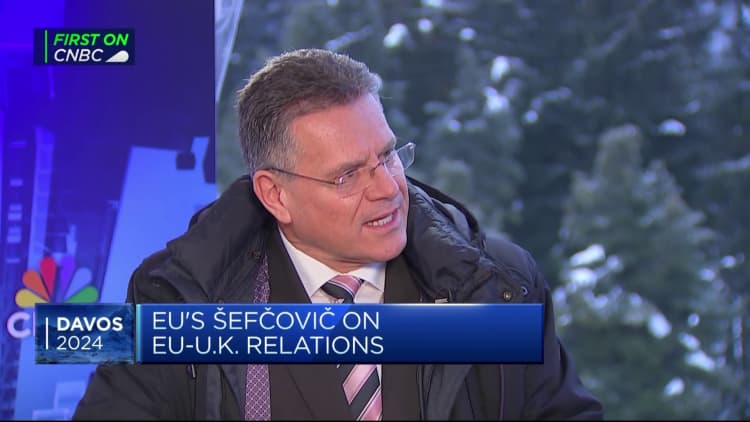
European Commission Vice President Maros Sefcovic said the organization must “adjust how we are supporting our businesses in Europe” by smoothening the process of granting permits, among other measures.
Asked how Europe will respond to competition from the U.S and China — the U.S. has invested billions of dollars into climate change technology and infrastructure, while China’s BYD has become the world’s top electric vehicle (EV) maker — Sefcovic said that the Commission is “ready to fight” for European businesses.
“We want you to prosper in Europe, because we have a lot to offer, we just have to be much faster, we have to be better at scaling up. And of course we have to do our utmost to make sure that sustainability, which is a trademark feature of European economies, will have a future here in Europe,” he told CNBC at the World Economic Forum in Davos, Switzerland.
The European government and national governments must provide a “one-stop shop” to support businesses financially, Sefcovic added.
— Lucy Handley
‘Europe is lagging behind’ on innovation, says Merck KGaA CEO
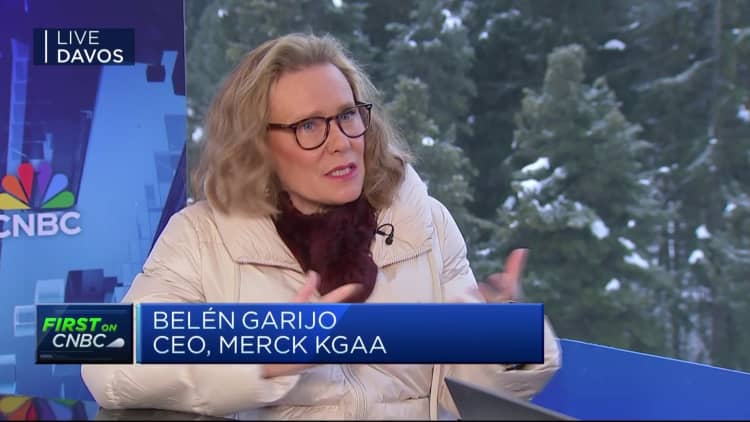
Belén Garijo, CEO of the multinational science and technology company Merck KGaA, says innovation is key to economic growth and prosperity and at this time “I believe Europe is lagging behind.”
Great power rivalries could derail the energy transition, professor says
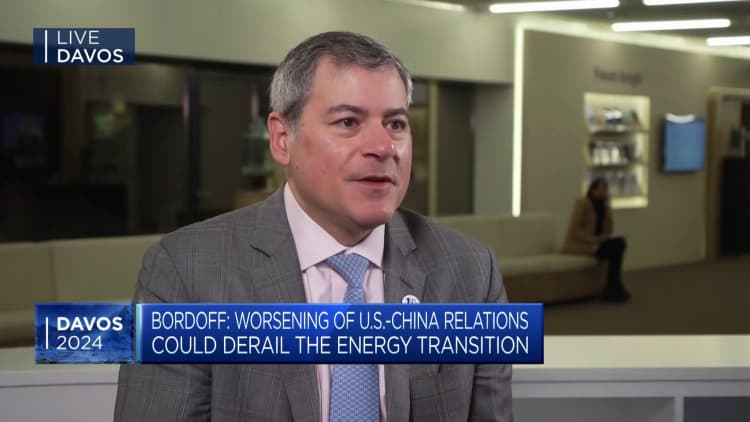
Jason Bordoff, the founding director of the Center on Global Energy Policy at Columbia University, discusses how elections throughout the world in 2024 might affect climate policy and what needs to be done to speed up the energy transition.
Barclays CEO: ‘I’m very optimistic on the UK’
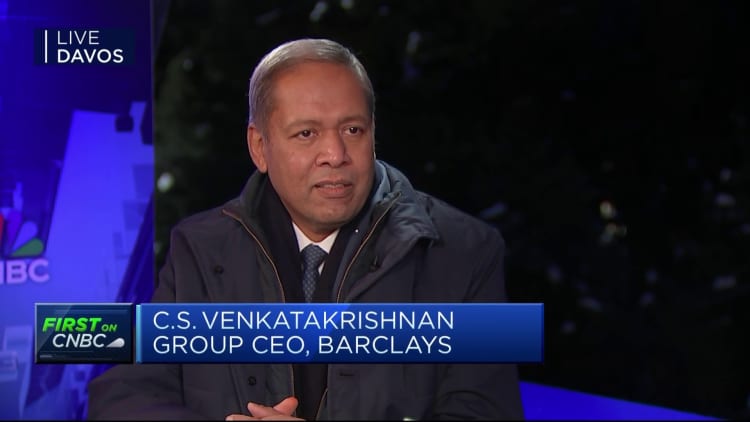
Barclays CEO C.S. Venkatakrishnan said he is “very optimistic” about the outlook for the U.K. economy, speaking to CNBC at the World Economic Forum in Davos, Switzerland.
“I think the U.K. consumer is in very decent shape … These pent-up savings have been getting eroded. On the other hand, it’s a floating rate mortgage market, and a lot of the mortgage adjustment has happened, because the average term is about three years fixed and we’ve had about three years of rising rates,” he said.
The typical products on offer to U.K. consumers are two-year and five-year mortgages.
“Energy prices have calmed down. So the two things that have hit the pocket book are coming down, and I will say I’m very optimistic on the U.K.,” he added.
— Lucy Handley
‘There’s a lot of errors’: CEOs discuss generative AI
Companies touting their artificial intelligence products dominated the Promenade, the main road in Davos. In past years at the World Economic Forum annual meeting, cryptocurrency firms were the most prominent down the Promenade. But AI fever has taken over in 2024.
Arjun Kharpal | CNBC
The rise of generative artificial intelligence (AI) has dominated public and private discussions at the World Economic Forum in Davos, Switzerland.
Accuracy was a key topic for technology leaders, with Intel‘s CEO Patrick Gelsinger telling CNBC: “How do you prove that a large language model is actually right? There’s a lot of errors today. So you still need, you know, essentially, I’m improving the productivity of a knowledge worker. But, at the end of the day, I need the knowledge worker to say is it right.”
The best way to improve accuracy is through experimentation and co-piloting tests to advance adoption, said Clara Shih, CEO of Salesforce AI.
“You can tell the AI to be conservative for higher stakes until a human co-pilot essentially graduates it to autopilot,” Shih said.
— Lucy Handley
Emmanuel Macron: We must be ‘more visible’ as Europeans during ‘pivotal year’
France’s President Emmanuel Macron delivers remarks, during the 54th annual meeting of the World Economic Forum, in Davos, Switzerland, January 17, 2024.
Denis Balibouse | Reuters
Europe must be more assertive on the world stage, according to French President Emmanuel Macron who spoke at the World Economic Forum in Davos, Switzerland, on Wednesday.
“2024 will be a pivotal year for Europeans. We must prove that we can be more visible, make more efforts, whatever happens in the United States,” he said at the event, according to a translation.
Macron also voiced concern about what the outcome of the year-end presidential election could mean for existing tensions between the U.S. and China.
“The great risk for Europeans is that they would end up with the wrong agenda,” he said.
— Lucy Handley
Centrist parties need to better articulate key issues, Dutch Prime Minister says
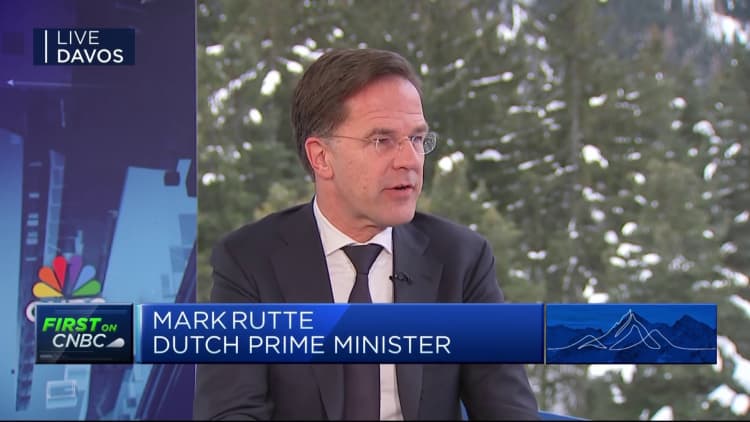
Dutch Prime Minister Mark Rutte told CNBC that centrist political parties need to better articulate their position on key issues.
“I think the centrist parties, like my party, right of center, have to be more successful — me myself, my party — to explain we are there for the economy, we are there for collective safety,” he said at the World Economic Forum in Davos, Switzerland.
He added that this means “you need strong nation states but also strong multilateral organizations, and the more right-wing parties are successfully challenging particularly that multilateral world order.”
Mark Rutte has served as Netherlands’ prime minister since 2010. However, a general election in November saw Geert Wilders’ far-right Freedom Party secure a decisive victory, with talks underway to form a new coalition government.
— Vicky McKeever

